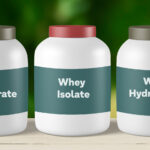
The competition between different types of protein is seemingly in full swing with every new day! Whey protein has always been a house-hold name, and a strong one at that, with regard to fitness enthusiasts for years that count more than all your fingers together.
But with changing times, new sources of proteins have been popping up for several reasons. Right from all the animal sources to rice, hemp, soy, peas- protein manufacturers are giving a multitude of options to choose from.
Talking about the new kid on the block- plant protein is one source that seems to be garnering quite some attention. Whether your goal is performance oriented or you are bound by certain limitations like allergies or food preference, plant protein is gaining some weightage in the fitness world.
But the big question is: How well does it do, up against something like Whey protein, the class-1 protein, when it comes to muscle building. Let’s explore:
Digestibility and absorptions: This is an important aspect when it comes to protein supplements and should be the main point of consideration. While many simply overlook this important factor and go directly to the amount of protein content, it really helps to know how is protein going to help with your digestion-which is exactly what is going to make or break your efforts in the gym.
Whey protein: The only problem that arises here is if you are intolerant to lactose which might lead to flatulence or poor absorption, depending on the level of sensitivity an individual shows towards it. However, not all types of whey protein are hard on the tummy. Whey Isolates and hydrolyzed whey are easy on the digestion and are also rapidly absorbed. In addition, for anyone who has no digestive/ allergies, whey can be a really good choice as it digests and gets absorbed real quick and sets to recovery immediately.
Plant protein: Since most plant sources are devoid of any allergen factors, it can be tried out. Also, since it is good with absorption, there isn’t any drawback with plant proteins, in this regard
Quality: When it comes to quality of a protein, it is often based on the amount of amino acid present. If all the nine essential aminos are present, it is considered as a complete amino acid profile and there’s no denying that complete proteins help in building muscle mass.
Suggested Read: Top Easy Five High-Fiber Recipes to Keep You Full
Whey protein: One of the selling points for Whey (whether it is whey concentrate, isolate or hydrozed), and the most important one at that, is the fact that it contains a complete amino acid profile and that is what classifies it as a class-1 protein. It also carries the BCAAs- leucine, isoleucine and valine in abundance, which are the main fuel needed for recovery, repair and growth of muscle mass.
Plant protein: While pea and help proteins have been shown to contain good amount of the 9 aminos necessary for muscle building, plant proteins have received criticism regarding incomplete amino acid profiles. As opposed to whey, including a plant protein calls for an inclusion of a variety of other dietary sources of protein to make up for the missing amino acids.
Muscle- building ability: The question that arises when comparing the 2 protein sources is, which one does the job better? At the end of the day, your main concern is to have a good quality protein that supports recovery and muscle build up.
Whey protein: It is pointless to argue over whey’s muscle-building potential. With an impressive amino acid profile, complete with all the essential amino acids in place, one cannot really complain about whey when it comes to results. However, as mentioned earlier, not all may be comfortable with whey (concentrates, in particular) but can definitely move on to isolates and save their digestive system from experiencing discomfort.
Plant protein: While some plant based proteins are deficient in certain amino acids, others might be missing them altogether. Although, it is possible to get over this drawback of plant-based protein by complementing the diets by including food groups that help make up for the missing amino acids. Hemp and pea proteins in particular contain ample amounts of all nine essential amino acids for your muscle building needs.
Nutrient quotient: this basically refers to the availability of nutrients in any food. When a certain food is full of protein, vitamins and/or minerals and is relatively low in calories it is considered nutrient dense. This is an ideal requirement for building muscle.
Whey protein: Whey protein is considered a class-1 protein as it provides a high amount of lean protein (with complete amino acid profile), carbs and fat to a reasonable extent along with certain B complex vitamins at a low caloric level. Another winning point for whey is that it contains Lactoferrin- a key component, present naturally in milk, in boosting immunity and has powerful anti-microbial, anti-cancer effects.
Plant protein: These are usually touted mostly for containing certain minerals, omega-3 fat (to some extent), and Vitamins. Since plants naturally uptake minerals from soil, those become a part of the supplements as well.
Add OZIVA Protein & Herbs Shake to Your Diet if your diet is lacking in proteins.
If you want a detailed nutrition consultation, drop us a mail at nutrition@oziva.in or call us on 9769298556 and our experts will help you with your fitness goal
Last modified: June 23, 2017


